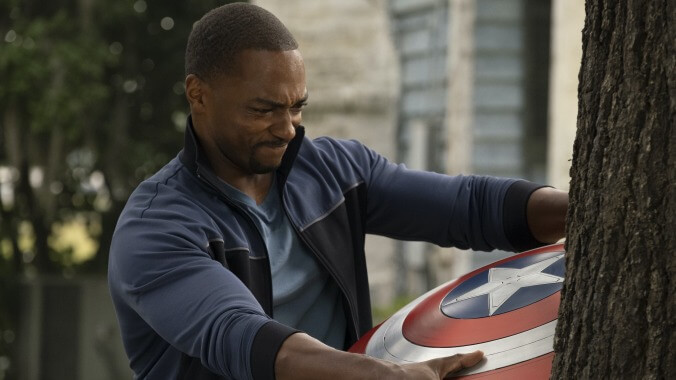In the episode, titled “New World Order,” Sam and his sister Sarah (Adepero Oduye) go to the bank they’ve been with for years to apply for a loan to help keep the family fishing business that Sarah—a single mom to two kids—runs in their hometown of Delacroix, Louisiana. Sam is sure that his detailed planning and famous identity will help secure the loan but the bank teller—a fan asking for a selfie at the most inopportune moment—doesn’t approve. He suggests that Wilson’s lack of income during the last five years (HELLO, he was literally snapped out of existence) along with new post-Blip rules have impacted this decision. However, the racist teller does ask questions most fans have wondered about for a long time, which this series is angling to dig into: “How do you guys [the Avengers] make money?” followed up by “Is there some kind of fund for heroes?”
Listen, we don’t need to worry about gods and kings here, but it’s obvious that Tony Stark/Iron Man was always extremely rich and didn’t need steady income. Bruce Banner/Hulk probably did well enough as a smart scientist (when he was working, anyway). The other OG Avengers like Steve Rogers/Cap, Natasha Romanoff/Black Widow, and Clint Barton/Hawkeye were on S.H.I.E.L.D. payroll until the organization crumbled to the ground. Technically, Stark put up Vision and Wanda in his fancy-looking compound, even though the former was supposed to be keeping the latter on a kind of house arrest. Clint’s farm was courtesy of Nick Fury after his retirement. Even characters like Peter Parker and Scott Lang found solace and high-tech costumes in Stark and Hank Pym, respectively. What Rogers, Romanoff, and Wilson did in the time between Civil War and Infinity War to keep their nomad lifestyle going is unknown (although Natasha strikes us as the kind of person who’d have a nest egg).
But if TFATWS’s premiere proves anything, it’s that the remaining Avengers—who were mostly side heroes until they got to lead their own shows—have to apparently run on goodwill. Sam basically says so in the episode. All this action about saving the world from evil, but no one thought of setting up an HR department and talk about unionizing?
As seen after the WandaVision finale, the fact that Wanda drives a compact Buick Verano became a fuel for internet memes. For a superhero credited with probably the most strength, is she not on some kind of well-deserved special payroll? Even the house plot in suburban WestView, New Jersey, that Vision purchases (with what credit score, one might wonder) for the two added to that question. The show made it clear that Wanda was pretty much left to fend for herself in every way after she helped defeat Thanos. At least monetarily, Bucky looks like he is on government-mandated therapy after being pardoned for his crimes committed under Hydra’s influence. Although, who is paying for his New York City apartment? They look tiny but don’t come cheap. Did he get a job?
Sam’s condition, and that of his sister, seems worse because race plays a big factor. The exchange at the bank and the arrival of a new white Captain America (when it was supposed to be Sam Wilson’s role, damnit!) is evidence of it. Race hasn’t been talked about in the MCU before—much like income, or the lack thereof except for in passing comments—but it is now taken seriously through the storylines of the Wilson siblings. The large-scale movies don’t want to get bogged down by talk of wages but now that Marvel TV has arrived, this can be fleshed out. In fact, we kind of want Sarah’s story to expand, but with only six episodes in season one, that seems difficult. More than anything, The Falcon And The Winter Soldier is throwing a spotlight on how even in this fictional universe, those who fought for humanity time and time again were quite easily cast aside. If being worthy of the iconic Captain America shield doesn’t warrant a sufficient paycheck, insurance, and a 401k, what does?


 Keep scrolling for more great stories from A.V. Club.
Keep scrolling for more great stories from A.V. Club.